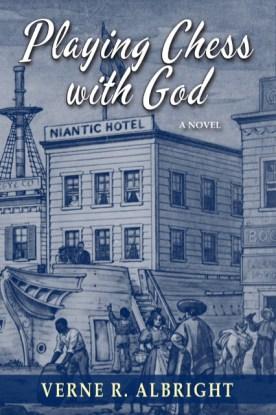Verne Albright lives in Calgary, Canada. He worked on two novels for twenty-three years and in the process received 153 rejection notices from agents and publishers. Again and again, friends and family told him his books were better than most that get published and that the publishers and agents were wrong. But rather than feel sorry for himself, he recognized the need to improve his manuscripts, which he did over and over until a publisher finally accepted them with enthusiasm.
For more on Verne Albright’s two historical fiction/adventure novels, see Playing Chess with God and The Wrath of God, or click/tap on the cover images.


Albright has several rules for success as an author:
Rule number one: The way to succeed as an author is to polish, edit, and rewrite as often as necessary to make your story so good that a publisher or agent falls in love with it. Don’t listen to people who commiserate with your failures. If you can’t get a publisher or agent, it’s almost invariably because your manuscript isn’t good enough. That was definitely the case with mine. How do I know? Because I, myself, like the latest version far better than any of its many predecessors.
Rule number two: This one will meet resistance because it costs a fair bit of money and gives new authors the idea that it will put them under the thumb of an ogre who’ll take all the fun out of writing by trying to change them. Rule number two is: Get a good editor – and the key word is good. Many so-called editors are ex-teachers whose mission is to enforce the rule of grammar and punctuation, sometimes to the point where they clean up the grammar of your uneducated characters as well as your university professors. They take all the fun out of writing by going through the manuscript with a red pencil and telling you how you should have said most of what you said.
A really good editor (mine calls herself a Rewrite Specialist, a far better description of the job) knows your book is yours and doesn’t impose his or her ideas. Instead, he or she reaches inside you and brings out your very best. If you’re open-minded, their suggestions will frequently strike you as improvements. But good editors give you general suggestions and leave the specifics to you. They usually cost around $4.00 a page, and are worth every penny.
Rule number three: The famous designer Coco Chanel – who was on Time Magazine’s list of the hundred most influential people of the last century – said that before leaving the house, a woman should look in the mirror and take off at least one piece of jewelry. Likewise, before submitting a manuscript, an author should remove all words and connective language that add no meaning. This should be done mercilessly in narrative, but a bit less stringently in dialog.
Remember the scene in A River Runs Through It where the father looks at his son’s theme for English class and says, “Write it again with half as many words,” then reads the result and says, “Again, please, with only half as many words”?
Nothing slows a story down as much as excess words and long descriptions. My first editor told me to always set my scenes with what he called “brushstrokes.” That, I soon discovered, meant enough detail to start the reader forming a mental image after which he’ll fill in the details on his own.
I hope these suggestions will help some aspiring writers succeed.
Verne R. Albright

